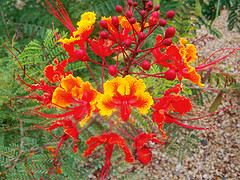This article in African News Dimension sings the praises of Bambara groundnut (Vigna subterranea), saying it could be grown and consumed a lot more in Malawi. Interestingly, one of the reasons why it is underutilized may be customs such as the one which says that only grandparents and widows are allowed to grow it.
Gorilla medicine?
Coincidentally, here’s a very detailed article which perhaps sheds some light on how some medicinal plants may come to be used by people. Aframomum melegueta is a herb in the ginger family which grows along the coast of West Africa. The seeds are sometimes called “Grains of Paradise,” and were traded as a spice in the 15th century, giving its area of origin the name of Grain Coast. The plant is used in traditional medicine, and biochemists at Rutger’s Biotechnology Centre have now isolated a powerful anti-inflammatory from the grains. But here’s the fun part: apparently, Western lowland gorillas really like Aframomum. Did local people learn to use the plant by watching the gorillas?
Selling African leafy vegetables
Not for the first time, a study suggests that indigenous and scientific knowledge can add value to each other. This one comes from South Africa’s Human Science Research Council (scroll down to p.14 of the pdf). It found that any interventions to assist small scale farmers in the study area — two districts in Limpopo — would have to be low-cost and based on locally available resources and technologies. One of these resources turns out to be local leafy vegetables. The survey found that almost all respondents consumed African leafy vegetables, and dried and stored their leaves for use during the dry winter. It suggested that the communities could generate significant income by marketing this produce more widely.
New medicinal plants
Speaking of medicinal plants, a remarkable study in Peru traces the traditional use of plants for all kinds of curative purposes from colonial times to the present. There’s an article on the work on SciDev.Net here but it is in Spanish. Although many plants used in colonial times have disappeared from the area of the study, traditional healers have replaced them with other species and have thus maintained their pharmacopeia. This is very much a living, evolving tradition.
Mysteries of medicinal plants remain
 A fascinating reflection by Dr S. Allen Coulter, professor of neurology and neurophysiology at Harvard Medical School and Massachusetts General Hospital, asks a question that perplexes many people: how did people acquire their detailed knowledge of the effects of plants on the body? Coulter’s musings are prompted by “scientific” studies on Caesalpinia pulcherrima, which reveal active ingredients that match the effects he was told by a wise person some years ago. I feel the same way about complicated food processing methods; how on earth did people learn how to render toxic and inedible things safe and delicious? Like Coulter, I fear we will never really know.
A fascinating reflection by Dr S. Allen Coulter, professor of neurology and neurophysiology at Harvard Medical School and Massachusetts General Hospital, asks a question that perplexes many people: how did people acquire their detailed knowledge of the effects of plants on the body? Coulter’s musings are prompted by “scientific” studies on Caesalpinia pulcherrima, which reveal active ingredients that match the effects he was told by a wise person some years ago. I feel the same way about complicated food processing methods; how on earth did people learn how to render toxic and inedible things safe and delicious? Like Coulter, I fear we will never really know.
Flickr photograph by Esther17 used under a Creative Commons License.